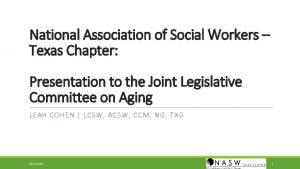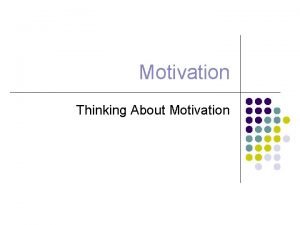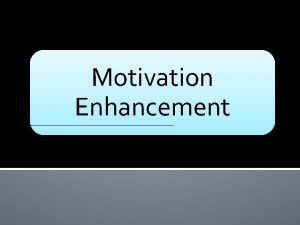Motivation Elaine Clavet Maria Gallo social workers psychotherapists




















- Slides: 20

Motivation Elaine Clavet , Maria Gallo social workers, psychotherapists

Brainstorming Activity Why do you think your friend, colleague, or neighbour helps their father, partner, or mother? Let’s categorize their motivations as good or bad together.

Questioning our motivations: an important step in the process of empowerment! When we think about the factors that motivate us, we need to account for unconscious motivators. (forgiveness, the desire to repair a fractured relationship, recognition, reinforcement of our self-worth, etc…) In order to facilitate our reflections, we can use the word “motivator”. Motivation would be the end result of all the motivators that influence us to act or make choices. To shine a light on the quest for answers about our motivators and motivations in caregiving, we need to retrace the steps of their history. When were you a caregiver for the first time?

Three categories to encourage reflection Material/financial motivators Affective/relational motivators Moral/philosophical motivators

Which motivator influenced most your choice to be a caregiver? Note that there may be multiple motivators involved. They can also vary over time.

Attention, beware!!!!! You may hear a little voice inside of you denying your motivators because society and education lead us to judge them as: Good or bad

Motivators are all acceptable The quality of the care you provide has nothing to do with what motivates you to provide that care! That small, critical voice that speaks up as you reflect on your motivation is due to a conflict between your values and motivators “Remember that motivation represents the sum total of energy that we expend in order to invest in a situation, and that energy makes itself known but should not be judged. ” Michelle Arcand et Lorraine Brissette, prévenir l’épuisement en relation d’aide , démarche, formation et animation. édition Gaétan Morin éditeur ltée, 1994.

Motivators – Energy & Symptoms of Fatigue For the duration of your caregiving role, it will be important to reevaluate your energy levels. Fatigue will be your barometer.

What are the signs of fatigue? One, two, three, go!… Write down your fatigue symptoms, rated on a scale of 1 to 10, 10 being the most intensity. Do I need to reevaluate the motivators behind my motivation? ? ? If my symptoms are intense, it’s necessary to reevaluate. Maybe it’s time to make a different choice!

Attention!!! If your expectations have not been met, if you are not satisfied, repeated disappointment or frustrations will reduce motivation. You must, therefore, pay attention to your health, since insatisfaction and frustration cost you energy and will put your physical and mental health at risk.

Good or Bad? ? ? Motivations: good or bad

Beliefs – Values – Motivators A conflict between your beliefs, your values, and your motivators can sap energy and make you feel guilty. Careful, guilt is your worst enemy!

Guilt and rumination: great friends! Often when we feel guilty, we feel like the hamster wheel gets going and doesn’t stop. Getting worked up, spending hours rehashing, going over every possible scenario… we end up with a laundry list of concerns swirling around our head. Rumination is not good for us! When a thought or idea keeps popping up in our thoughts, when they take up too much space, when they keep us from thinking about other things, they use up all of our time and energy. Khouloud Kebali

Rumination

Rumination and Guilt Rumination, a sign to move to action It may seem odd but you can make a habit of using rumination as a sign to move into action. Over the next few days, every time you notice that you’re ruminating, identify it to yourself (I’m ruminating), then move on to a different action. If you do this over several days, you should notice a significant reduction in the amount of time spent ruminating and improved well-being as a result. Use the following observation grid to note the situations where you tend to ruminate, theme of your rumination, and the alternative behaviours you might engage in to replace your ruminating. Situation Rumination Signal Action. PCL-6109 LES PSYCHOTHÉRAPIES COGNITIVO‑COMPORTEMENTALES FONDÉES SUR L'ACCEPTATION ET LA PLEINE CONSCIENCE

Taking care of yourself is without question your first obligation as a caregiver You are precious You have the right to your wellbeing even if the situation is difficult, You have the right to maintain your physical and mental health, You have the right to set limits even if doing so is difficult on your loved one, You do not have your loved one’s illness, even if it has a significant impact on your life, You have the right to be happy, even if your loved one is suffering, Moments where you get a break or have fun do not mean that you are betraying your loved one.

What will you take away from this workshop? Share - exchange

Make a commitment to yourself and choose an action you will do for yourself in the next week to improve your wellbeing as a caregiver.

Thank you for your participation Elaine Clavet social worker, psychotherapist, supervisor and consultant. 514 -975 -2914 Maria José Gallo social worker, psychotherapist 514 -568 -5255

The rights to use and publish this document are reserved by its authors. Neither partial nor complete use of this document is allowed without the written permission of its authors.
 Maria clavet
Maria clavet Gallo viejo y gallo joven
Gallo viejo y gallo joven College of registered psychotherapists of ontario
College of registered psychotherapists of ontario Clavet school
Clavet school Social workers must have infinite flexibility
Social workers must have infinite flexibility Assessment questions social work
Assessment questions social work Interpersonal skills for social workers
Interpersonal skills for social workers National organization of forensic social work
National organization of forensic social work National association of social workers texas
National association of social workers texas Rubens gallo
Rubens gallo Il gallo cedrone montale
Il gallo cedrone montale Un granjero tenía unas cuantas gallinas en su corral
Un granjero tenía unas cuantas gallinas en su corral Gallo management development program
Gallo management development program Gallo significado denotativo y connotativo
Gallo significado denotativo y connotativo Lectura misa hoy
Lectura misa hoy Suelta un gallo
Suelta un gallo Escuela pedro leon gallo
Escuela pedro leon gallo Picadillo costa rica
Picadillo costa rica Gallo
Gallo Kikirikí estoy aquí decía el gallo colibrí
Kikirikí estoy aquí decía el gallo colibrí Gallo records manager
Gallo records manager




































